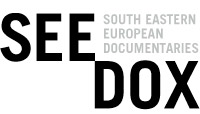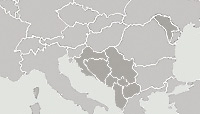EUROPE SEEKS DISCUSSION PARTNERS by Vladimir C. Sever
The 8th goEast Festival of Middle- and Eastern-European Cinema, Wiesbaden, Germany, April 9-15 2008
Even though Croatian cinema hasn’t come away from Wiesbaden bearing awards (unlike in the previous two years), the goEast festival itself has had its best showing yet in many respects, as the most comprehensive platform for presentation, evaluation, initiative and theory dedicated to the transitional cinema within the EU. The festival leadership, headed by Christine Kopf, has now put all the elements of a serious festival concept and actualization in place, turning goEast into a key point of connection between the old and the new Europe.
This year has supported the established feature, documentary and student competitions, a great filmmaker’s retrospective (Sergej Paradžanov, this time), a series of workshops, and a Robert Bosch Foundation co-production contest (with Croatian filmmaker Dino Krpan among the contestants), with another thorough symposium – moreover, one with a subject matter of special concern to us. Entitled “Between Politics and Aesthetics: Documentary Film in Southeastern Europe since the Nineties”, it offered a four-day analysis of different ways in which documentary films interact with the processes of nation-building in the countries of the former Yugoslavia.
Within this subject – which included an overview of the leading documentaries made before the national independences, among them the Croatian titles Čvor and Specijalni vlakovi by Krsto Papić – two elements were of the largest interest. First, the German film scholars and theorists (dr. Hans-Joachim Schlegel, Bernd Buder, Margit Rohringer and Aleksandar Perović) have a very thorough approach to many facets of documentary cinema, of a kind all too rarely seen among their local counterparts here: in other words, they don’t only evaluate the films formally and structurally, but also investigate ways in which it conceptualises and investigates the social, political, national and historical essence of its time. Among the topics were the processes of building the enlightened and individualised nations from the remains of a supra-national entity, and the ways in which documentary cinema has been abused for propaganda purposes. A special stress was put on the documentary’s importance in the creation of an awareness needed to avoid Yugoslavia’s mistakes in the process of incorporating these new, independent states into a new supra-national entity, the EU. Moreover, there was discussion of the similarities and differences among the regional filmmakers’ approaches to the subjects that are both shared by all and specific to them, synchronically as well as diachronically.
This entire aspect of the symposium held the highest respect for the identity of the national states, both during the time of their federal life, and after their separation. This is the reason why the other aspect is so striking: although the independent director and producer from Zagreb, Nebojša Slijepčević, took a constructive part in the symposium, the first choice for a speaker from Croatia, Nenad Puhovski, refused to participate for reasons best known to him. As Puhovski is our most active producer of politically activist documentary cinema, with no equivalent among the scholars, it can only be hoped that the recent conceptual changes in Croatian cinema will bring to light proper participants for such exchanges from the level of our educational and cultural institutions – although there is, as yet, no reason to believe in such a development.
As for the film schools, the presentation of the works by the students from Poland (Andrzej Wajda Master School, Warszaw), the Czech Republic (FAMU, Prague), and Germany (academies from Potsdam, Mainz, and the Rhein-Mein region) revealed a level of seriousness in finding and presenting the subject that has eluded Croatian cinema for the most part, being more of an individual exception than a product of competent teaching at the ADU. Indeed, it seems that the insistence of the leaders of our only film school on directing TV soaps in their spare time is the most effective possible barrier to the mature creativity and enlightened humanity in cinema, of the sort seen here, which is certainly not good news for their current students.
The mature filmmakers of the new Europe, on the other hand, revealed exceptional creative strength in this year’s feature competition, one of the strongest at goEast ever. The absolute winner – recepient of both the Best Picture and FIPRESCI awards – was the Estonian film Magnus, made for just a few tens of thousands of Euros, and one of the most moving and least sentimental analyses of the phenomenon of teenage suicide within the recent Baltic, and indeed European output. Side by side with Magnus stand the films made in smaller and poorer nations than Croatia: the Ukrainian At the River – where the director, Eva Nejman, subtly characterises two elderly ladies at an apparently leisurely, but in actuality truly existential boating trip – and I Am from Titov Veles, a moving story of three sisters in today’s Macedonia, victims of environmental damages of forced industrialization from Tito’s era, and the hopeless isolation of their homeland. Also of note were Simple things, the second film by the Russian director Alexei Popogrebsky, the maker of the admired Koktebel, and Love and Other Crimes, the feature debut of Stefan Arsenijević, the Oscar nominee from Belgrade. They all vouch for the level of the eighth goEast.
After the awards for Ivona Juka in 2006 and Ognjen Sviličić in 2007, it is to be hoped that in 2009 Croatian cinema will be adequately represented once again – although this will require much more than gifted filmmakers, as this year has clearly shown.
Vladimir C. Sever



















